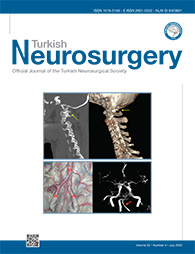2University of Nottingham Queens Medical Center, Department of Neurosurgery, Nottingham, United Kingdom
3University Hospital Birmingham, Department of Neurosurgery, Birmingham, United Kingdom DOI : 10.5137/1019-5149.JTN.32860-20.2 AIM: To assess the real challenges faced by neurosurgery residents in developing countries with limited resources and massive workload.
MATERIAL and METHODS: This is a cross-sectional study based on the questionnaire filled by the neurosurgery trainees in Pakistan directed at their training, stress factors, surgical competency, research interest, job satisfaction, and future endeavors.
RESULTS: A total of 75 neurosurgery residents participated in study; 73.3% were male. About 61.3% were working for more than 72 hours per week. Average sleeping hours per day were less than 7 hours for 92% of trainees. Only 78.6% were able to receive teaching sessions for at least once a week or more. Practical handling of neurosurgical gadgets like microscope and endoscope was never experienced by 26.7% and 18.7%, respectively. Even the senior most residents were able to perform only 41.08% of their surgeries independently. Financial support was only acceptable to 21.3%, and 60.9% want to leave the country upon training completion.
CONCLUSION: The training programs in the developing countries need critical changes to provide favorable learning conditions with availability of appropriate surgical tools, structural changes of training programs, development of research interest, and improvement on the socioeconomic needs of the trainee.
Keywords : Neurosurgery training, Developing country, Residency program




